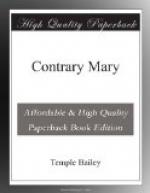“I know you can, dear boy,” she bent and kissed him.
“You’ll take care of Leila,” he begged, and then, very low, “I’m afraid I’ve made an awful mess of things, Mary.”
“You mustn’t think of that—just think, Barry—of the day when you come back! How all the wedding bells will ring!”
But he thought of a wedding where there had been no bells. He thought of Little-Lovely Leila, in her yellow gown on the night of the mad March moon.
“You’ll take care of her,” he said again, and Mary promised.
And now the Bishop arrived, and certain old friends of the family. As Barry and Mary made their way up-stairs, they met Susan with the mail. There was one long letter for Mary, which she tore open with eagerness, glanced at it, and tucked it into her girdle, then went on with winged feet.
Porter, glancing at her as she came in, was struck by the radiance of her aspect. How lovely she was with that flush on her cheek, and with her sweet shining eyes!
With due formality and with the proper number of godfathers and godmothers, little Mary-Constance Ballard Richardson was officially named.
During the ceremony, Leila sat by her father’s side, her hand in his. In these days the child clung to the strong old soldier. When she had come back to consciousness on the night that she had fainted on the threshold of the library, he had asked, “My darling, what is it?”
And she had cried, “Oh, Dad, Dad,” and had wept in his arms. But she had not told him that she was Barry’s wife. It was because of Barry’s going, she had admitted; it seemed as if her heart would break.
The General talked the situation over with Mary. “How will she stand it, when he is really gone?”
“It will be better when the parting is over, and she settles down to other things.”
Yet that day, after the christening, Mary wondered if what she had said was true. What would life hold for Leila when Barry was gone?
Her own life without Roger Poole was blank. Reluctantly, she was forced to admit it. Constance, the baby, Porter, these were the shadows, Roger was the substance.
The letters which had passed between them had shown her depths in him which had hitherto been unrevealed. Comparing him with Porter Bigelow, she realized that Porter could never say the things which Roger said; he could not think them.
And while in the eyes of the world Roger was a defeated man, and Porter a successful one, yet there was this to think of, that Porter’s qualities were negative rather than positive. With all of his opportunities, he was narrowing his life to the pursuit of pleasure and his love for her. Roger had shirked responsibility toward his fellow man by withdrawal; Porter was shirking by indifference.
So she found herself, as many another woman has found herself, fighting the battle of the less fortunate. Roger wanted her, yet pressed no claim. Porter wanted her and meant to have her.




